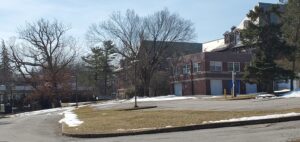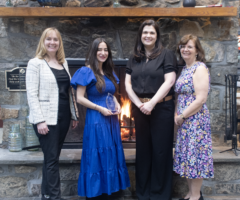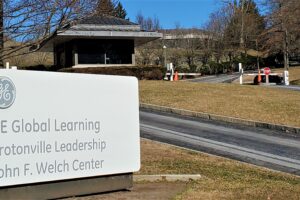 Briarcliff Manor’s Board of Trustees rebuffed a request by a lawyer for a Monsey-based congregation to refer its application to open a yeshiva on the former Pace campus to the village Planning Board.
Briarcliff Manor’s Board of Trustees rebuffed a request by a lawyer for a Monsey-based congregation to refer its application to open a yeshiva on the former Pace campus to the village Planning Board.
Mayor Steven Vescio told a lawyer representing Yeshivath Viznitz Dkhal Torath Chaim that trustees needed more information about the congregation’s plans to accommodate 250 college-age students at the Elm Road site before moving the plan into the approval process.
The Sept. 14 exchange between Vescio and Daniel Patrick, of the White Plains law firm Cuddy & Feder, followed Patrick’s 12-minute presentation before the board and residents in the audience and on Zoom.
Vescio told Patrick that it was “a little early” to make a referral because the board was awaiting studies on traffic, the environment and other impacts, but Patrick said he believed there was enough information in the application to hand it over to the Planning Board.
Vescio disagreed.
“I don’t think this board is in a position tonight to refer this to the Planning Board for the reasons mentioned prior. However, I know you’ve submitted twice, I know you guys are anxious, that’s why we’re having you here tonight … We want to get you going through the process, we just need to make sure we have all the information so that we can make the referral and get going.”
The Sept. 14 discussion also delved into what type of environmental study would be required, with Patrick seeking a review that deemed there would be no significant impact, while the board was advised by its land use counsel Steve Barshov to apply more stringent standards. The mayor said the village board intends to designate itself as lead agency in the environmental review process.
Patrick told the board that no new buildings were being requested on the campus, and renovation work would mainly focus on cleanup, facades and interior floor space. A rendering of an expanded dining hall was presented.
The 45-minute discussion was the first appearance by the congregation since it purchased the 37-acre campus on 235 Elm Road for $11.75 million in March.
No date for any further action by the Board of Trustees can be set until the applicant submits the required information, Vescio wrote in an email.
The religious organization’s arrival has been a topic of concern among residents, especially those aware of the congregation’s ongoing dispute with the Rockland County village of South Nyack over its use of a former college campus there. The issue ignited a movement to disband South Nyack, a process that is underway.
In Briarcliff, the Hasidic group has applied for a special permit to use the former Pace property to educate men ages 17-20, most of whom would live on the campus. It is also seeking tax-exempt status for the property.
A handful of neighbors spoke during Sept. 14 the meeting, some raising concerns about the potential of hazardous materials in the old buildings and the effects of the yeshiva on the public school system. Other issues included concerns that traffic estimates were underestimated, and whether buses bringing students and staff to the campus would come through the central business district.
Yeshiva’s 10-year plan
Meanwhile, documents filed recently by Cuddy & Feder contained further details on the proposal.
While its June filing anticipated 250 students, it now estimates an annual growth of 3% for the first 10 years, bringing occupancy to 350. The application states this total is still below the permitted capacity of 700 residential and 400 non-residential students when Pace University was in operation.
The plans call for hosting 5-10 events on campus throughout the year, such as graduations and holiday celebrations. Most would be smaller events for 20- 25 guests, with others attracting up to 150 outside guests. Visitors would mostly arrive by bus, shuttle, and carpool, which the yeshiva stated would limit parking or traffic concerns.
The yeshiva’s initial filing stated its plan would have no negative impact on the neighborhood or community, and meets all criteria for receiving the special permit required to operate a school on the site.
The 66-page document filed with the village June 18 by Cuddy & Feder LLP states:
- The private school would have no adverse impact on the environment, traffic or services like police, fire and EMS coverage.
- The projected enrollment of 250 students — most of whom would live on campus — is far below the 700 residential and 400 commuter students allowed under Pace’s 1978 special permit, and before that, Briarcliff College’s estimated annual enrollment of 688.
- An estimated $3 million in renovations and expansion are proposed to the existing structures, with the yeshiva occupying three entirely and part of a fourth of the property’s nine buildings.
- An estimated two to three buses and four minivans per day would transport commuters to and from the site.
- The proposed yeshiva’s approximately 40 faculty and staff members would not live on campus, although short-term housing would be available.
- The proposed yeshiva would generate significantly less traffic than the former Pace campus during peak hours as well over the course of the day.
- Special traffic control measures would be used on holidays and graduations when higher attendance than normal would be anticipated.
Briarcliff College operated at the Elm Road site from 1905 until 1977, when it was sold to Pace. Pace closed its doors in 2015 and the property was sold in 2017 to the Research Center on Natural Conservation for $17.4 million.
Previous coverage:
Yeshiva: Pace Campus Reuse Would Have ‘No Adverse’ Impacts






